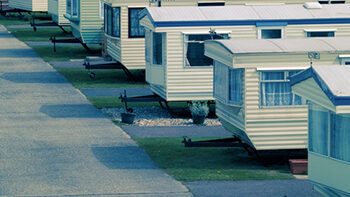
What is mobile home insurance?
Despite the name, mobile home insurance policies cover more than just physically movable homes. In today’s housing market, plenty of attractive, functional and inexpensive manufactured homes exist, which provide reliable housing to millions of Americans. However, as these houses are produced in a factory rather than built slowly at a construction site, they are often classified differently than traditional homes. Because of this distinction, most manufactured homes are unable to be covered under traditional homeowner’s insurance policies. There are a variety of reasons why this is the case, but the main point is that a different type of insurance had to be developed in order to cater to the more specific needs of mobile home properties. This is where mobile home insurance comes into play.Standard Mobile Home Coverage Options
The most basic mobile home policy options cover a lot of different things and they separated into two different categories. The first set of coverages under standard mobile home insurance is the physical structure of your home, as well as the belongings inside it. This is the most readily apparent insurance need, as you will want to have your actual home insured in case there is some kind of natural disaster that sweeps in and damages it. You should know that the things that you are protecting your manufactured home from do not necessarily have to be natural disasters. Known as perils, these devastating events can include the following:- Fire, smoke or lightning damage
- Wind, hail, tornado or hurricane damage
- Explosion damage
- Theft or vandalism
- Frozen plumbing damage
What can I do if I need more mobile home coverage?
Sometimes, however, the standard mobile home coverage policies do not cover enough situations that you may see as a mobile home owner. In these cases, you may wish to look for optional mobile home insurance to add onto your existing coverage. Every manufactured home is different, and has a different set of needs. Some optional mobile home coverage options include:- Land property coverage: This includes financial protection for your lawn, garden, trees, landscaping and more around your mobile home. Standard mobile home coverage options generally only cover the home itself.
- Business item coverage: If you run a business out of your manufactured home, the products and equipment that you need may not be covered under a standard insurance policy. However, you can choose to get extra coverage for your business.
- Water damage coverage: Just as traditional homeowners insurance is sometimes not enough to cover flooding and water damage, mobile home insurance often requires extra coverage, as well. This can help cover plumbing problems with drainage, or sump pump issues.
- Identity theft coverage: This may seem like it differs from the boundaries of mobile home insurance, but identity theft can often be considered similar to normal theft, and brings with it just as many problems. By paying for this additional coverage, you can get help with the legal fees and lost money that you might someday need to deal with if you ever have your identity stolen.
How to Pay Less for Mobile Home Insurance
While all of this mobile home coverage is great for protecting your family’s property and assets, it can be expensive to maintain paying all of the associated costs that come with such insurance. In fact, although manufactured homes are cheaper than traditional homes in terms of mortgages and upkeep, it can be just as expensive to insure these homes as it is to insure a traditional house. As such, it can be a good idea to consider the many different ways in which you can pay less for mobile home coverage that you need. One general rule to live by is that although extra insurance can be helpful, you should only pay for whatever insurance you really need. Having supplemental mobile home insurance to cover your expensive golf clubs is great to have if you can afford it, but you should weigh the pros and cons of potentially getting rid of that added cost. The more coverage you receive, the higher your insurance premiums will cost. However, if your premiums are higher, that generally also equates to having a lower deductible, or amount that you must pay before your insurance is able to cover the rest. There is always a balancing act in paying for insurance, and there are many other ways to cut costs here and there in order to get the best insurance that you need for the lowest possible price.By Admin –